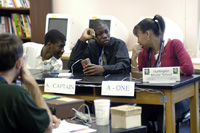Huntington Middle School students confer during JLab's inaugural Virginia Regional Middle School Science Bowl.
Today, U.S. Secretary of Energy Spencer Abraham announced that the U.S. Department of Energy (DOE) and its national laboratories are launching an initiative to promote science literacy and help develop the next generation of scientists and engineers.
The initiative features a seven-step program called STARS: Scientists Teaching and Reaching Students. STARS is designed to enhance the training of America's mathematics and science teachers; grow students' interest in science and math, especially in the critical middle school years; and draw attention to the women and men who have done DOE science so very well — and thereby encourage young people and prospective teachers to pursue careers in math and science.
"Jefferson Lab's goal is to push knowledge of nuclear physics beyond current theory using innovative technologies, many developed at the Lab. An inherent feature of that goal is the responsibility to share our results with other researchers, with the scientists of tomorrow and with the public, whether it's school kids or simply interested residents in our local community. We do this through our many community outreach and educational programs," says Jefferson Lab Director Christoph Leemann.
Jefferson Lab offers many programs that support and complement the new DOE education initiative and STARS. Here are just a few of Jefferson Lab's community outreach and education programs:
The BEAMS (Becoming Enthusiastic About Math and Science) program brings classes of 6th, 7th, and 8th grade at-risk students (1800 per year) and their teachers to Jefferson Lab for science and math interactive activities. Sixth grade students and their teachers spend five days immersed in Jefferson Lab's research environment interacting with scientists, engineers, and technicians as they participate in science and math activities. As these students progress through the 7th and 8th grades, additional Jefferson Lab-oriented education opportunities are provided. The goals of the program are to increase the representation of minorities and women in the science and engineering workforce; motivate students and strengthen their academic preparation; and provide teachers with classroom activities based on the science and technology at Jefferson Lab. The Lab assesses the impact and effectiveness of BEAMS in contributing to student achievement as defined by the National Science Education Goals and Virginia Standards of Learning (SOL). SOL results indicate that students participating in BEAMS are performing better academically than students at comparable at-risk schools not participating in BEAMS.
TAPS (Teacher Academy in Physical Science) is a four-week program for upper elementary and middle school teachers with the following components: a course in basic physics (50 hours), guest lectures on current research by Lab staff (20 hours), workshops on improving physical science instruction at the middle school level (20 hours), and team-based hands-on explorations under the guidance of JLab staff (70 hours). The goals of the program are to enhance teacher content knowledge and skills, including leadership skills; increase teacher awareness and ability to communicate with their students about current issues in science and technology; build teacher competence and confidence by offering teachers an opportunity for revitalization and recognition; and support the inclusion of each teacher as a valued member of the professional science and technology community.
During the school year, and on special dates in the summer, students can attend Physics Fest — a presentation featuring Jefferson Lab's science and technology and a hands-on demonstration of electrostatics, cryogenics and plasmas.
HSSHP (High School Summer Honors Program) allows high school students to participate in scientific or technical activities for eight weeks during the summer. The students chosen for these positions are strong in math, science and/or computer science and are interested in pursuing scientific and technical careers.
The PST (Pre-Service Teachers) ten-week internship program provides educational training and research experiences for undergraduate students preparing to become K-12 science teachers. Each student has two mentors, a local physics teacher and a Lab scientist.
Each fall and spring, Jefferson Lab hosts the Science Series to engage the public in a range of current scientific topics. Guest speakers from across the nation are invited to the Lab to present their sometimes entertaining or thought-provoking, but always informative lectures or demonstrations. Past subjects include the physics of NASCAR, how memory works and the science and technology behind television.
In other community outreach efforts, Jefferson Lab hosts a biennial Open House and science demonstrations at the Virginia State Fair, makes scientists available for Career Day school visits and offers an education web site that serves as a comprehensive resource for science students, with Virginia Standards of Learning practice tests (with answer explanations) logging half a million hits on its busiest days. For more information on these and other programs, please visit the Jefferson Lab Science Education web site: http://education.jlab.org/.
For more information regarding the DOE announcement, please visit http://www.science.doe.gov/Sub/Newsroom/News_Releases/DOE-SC/2004/Education-Initiative/Education-Initiative.htm


